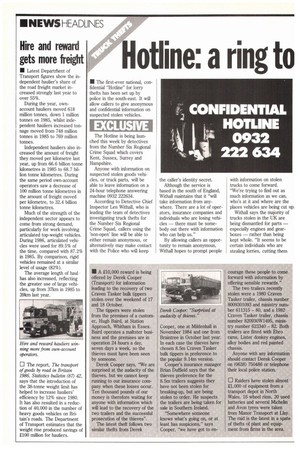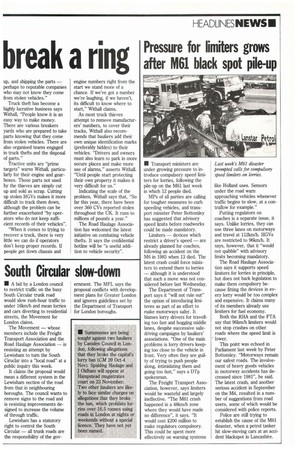Hotline: a ring to break a ring
Page 6

Page 7

If you've noticed an error in this article please click here to report it so we can fix it.
• The first-ever national, confidential "Hotline" for lorry thefts has been set up by police in the south-east. It will allow callers to give anonymous and confidential information on suspected stolen vehicles.
EXCLUSIVE
The Hotline is being launched this week by detectives from the Number Six Regional Crime Squad which covers Kent, Sussex, Surrey and Hampshire.
Anyone with information on suspected stolen goods vehicles, or truck parts, will be able to leave information on a 24-hour telephone answering machine 0932 222634.
According to Detective Chief Inspector Len Withall, who is leading the team of detectives investigating truck thefts for the Number Six Regional Crime Squad, callers using the 'non-open' line will be able to either remain anonymous, or alternatively may make contact with the Police who will keep the caller's identity secret.
Although the service is based in the south of England, Withall maintains that it "will take information from anywhere. There are a lot of operators, insurance companies and individuals who are losing vehicles — there must be somebody out there with information who can help us."
By allowing callers an opportunity to remain anonymous, Withall hopes to prompt people with information on stolen trucks to come forward. "We're trying to find out as much information as we can, who's at it and where are the places vehicles are being cut up.
Withall says the majority of trucks stolen in the UK are being dismantled for parts — especially engines and gearboxes — rather than being kept whole. "It seems to be certain individuals who are stealing lorries, cutting them up, and shipping the parts — perhaps to reputable companies who may not know they come from stolen vehicles."
Truck theft has become a highly lucrative business says Withall, "People know it is an easy way to make money. There are various breakers yards who are prepared to take parts knowing that they come from stolen vehicles. There are also organised teams engaged in truck thefts and the disposal of parts."
Tractive units are "prime targets" warns Withall, particularly for their engine and gearboxes. Those parts not used by the thieves are simply cut up and sold as scrap. Cutting up stolen HGVs makes it more difficult to track them down, although the problem can be further exacerbated "by operators who do not keep sufficient records of their vehicles".
"When it comes to trying to recover a truck, there is very little we can do if operators don't keep proper records. If people get down chassis and engine numbers right from the start we stand more of a chance. If we've got a number we're laughing, if we haven't, its difficult to know where to start," Withal! claims.
As most truck thieves attempt to remove manufacturers' numbers, to cover their tracks, Withall also recommends that hauliers add their own unique identification marks (preferably hidden) to their vehicles. "Drivers and owners must also learn to park in more secure places and make more use of alarms," asserts Withall. "Until people start protecting their own property it makes it very difficult for us."
Indicating the scale of the problem, Withal] says that, "So far this year, there have been over 360 CVs reported stolen throughout the UK. It runs to millions of pounds a year."
The Road Haulage Association has welcomed the latest initiative on combating vehicle thefts. It says the confidential hotline will be "a useful addition to vehicle security".








































































































